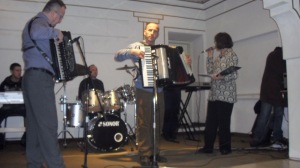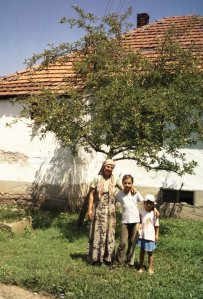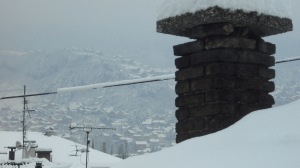This is the 4th in a series of articles that friends encouraged me to write after returning from a trip to Bosnia and Croatia in January and February 2011. These articles chronicle people’s generosity and kindness, emotions and experiences. This article will focus on the wonderful memories I brought home from Sarajevo from January 23-28. Some photos are included, but you can see all the photos here.

The sebilj where people meet in the old market Bascarsija
The 23rd provided a needed rest after the intense emotions of the previous day’s memorial service for Omer Pobric. I spent the morning in meditation, prayer and writing.

The beautiful Selma Babic Prolic
That afternoon, my dear young friend Selma Babic Prolic came to Halvat Guesthouse for a lovely visit. I met Selma when she visited her sister in Seattle several years ago when she melted my heart by singing several sevdalinke with her achingly beautiful voice. Her real passion, however, is East Indian music. It’s ironic. I’m an American who sings sevdalinke and she’s a Bosnian who sings East Indian music. A crazy world! Our time was way too short, but I hope she will be in Seattle within the next year where I will hold her to her promise to stay with my family for part of her visit.
That evening I met Dr. Semir Vranic at the sebilj, the public water fountain in the shape of a gazebo in the main square of Bascarsija. It is not only a source of cool refreshing water, but a landmark where Sarajevans regularly meet or stop to chat. Dr. Vranic was a close friend to Omer Pobric, is a member of the Sevdah Institute Omer Pobric, and a generous source of information about sevdalinke and its artists. His website and blog are among the finest available resources for sevdah-related information and his website and blog.

Dr. Semir Vranic
Semir has provided me countless articles, books and recordings, and become a good friend in the process. Thank you, Semire!
Bascarsija, the old market of Sarajevo, is such an incredible place. Many people have written about its beautiful atmosphere of shops, restaurants serving čevapi and pita, mosques, churches and people strolling through its streets. I love it all, but one feature that I love the most is that it’s guaranteed you’ll run into someone you know.  Not just friends, but celebrities and politicians. For instance, my heart almost stopped when I met pop singer Dino Merlin. On another occasion, walking with Jasmin Odobasic I met Jovan Divjak, a General in the Bosnian army during 1992-95 war, and is recognized by Sarajevans as their beloved defender. Speaking of politicians, Mr. Odobasic took me to the office of Stjepan Kljuic. Now a journalist book distributer, Mr. Kljuic was Bosnian Croat politician and a member of the presidency of Bosnia. He also founded and was president in 1992 of the Olympic Committee. I urged him to write his memoir based on the stories he told us in just a short hour. He’s led a fascinating life.
Not just friends, but celebrities and politicians. For instance, my heart almost stopped when I met pop singer Dino Merlin. On another occasion, walking with Jasmin Odobasic I met Jovan Divjak, a General in the Bosnian army during 1992-95 war, and is recognized by Sarajevans as their beloved defender. Speaking of politicians, Mr. Odobasic took me to the office of Stjepan Kljuic. Now a journalist book distributer, Mr. Kljuic was Bosnian Croat politician and a member of the presidency of Bosnia. He also founded and was president in 1992 of the Olympic Committee. I urged him to write his memoir based on the stories he told us in just a short hour. He’s led a fascinating life.

Zaklina Ninkovic, International Relations Director
On Monday, January 24, it was my great pleasure to visit the Red Cross Society of Bosnia and Herzegovina where Zaklina Ninkovic, International Relations Coordinator, as well as other wonderful staff members devoted their morning to informing me of their work.
The range of their activities is impressive, particularly considering the limited resources under which they work. Here is an example of some of their many programs: mine risk education, training for trainers, first aid, disaster awareness, climate change, tuberculoses initiative, home care for elderly and disabled, and community development programs. I was particularly impressed and pleased to learn of their youth development programs such as the “Red Cross Values” and “Red Cross in Action – Promotion of Human Values,” as well as youth camps such as “Friendship Without Borders” that includes a peaceful reconciliation component.  Their office has one worker who works specifically with Roma people and communities. The Red Cross cooperates on a number of projects with the ICRC with whom I met the following day. We ended our morning with the entire staff over coffee and cake. I was extremely touched by their hospitality.
Their office has one worker who works specifically with Roma people and communities. The Red Cross cooperates on a number of projects with the ICRC with whom I met the following day. We ended our morning with the entire staff over coffee and cake. I was extremely touched by their hospitality.
I would encourage people in North America to support the work of RCSBH through donations and by urging family members in Bosnia and Herzegovina to become volunteers.
 That afternoon I had the great pleasure and honor of meeting Majo Dizdar. Himself an accomplished journalist and photographer, he also has the distinction of being the son of one of Bosnia’s finest poets, Mak Dizdar author of Stone Sleeper. Such a jewel! Majo generously offered to take me to the National Museum. What better guide could I have than Majo Dizdar, author of Sarajevo, The Tourist –Historic Guide (Sejtarija, 2007)? Unfortunately, the museum was closed unexpectedly that day, however he suggested we visit the historic Svrzina Kuca instead.
That afternoon I had the great pleasure and honor of meeting Majo Dizdar. Himself an accomplished journalist and photographer, he also has the distinction of being the son of one of Bosnia’s finest poets, Mak Dizdar author of Stone Sleeper. Such a jewel! Majo generously offered to take me to the National Museum. What better guide could I have than Majo Dizdar, author of Sarajevo, The Tourist –Historic Guide (Sejtarija, 2007)? Unfortunately, the museum was closed unexpectedly that day, however he suggested we visit the historic Svrzina Kuca instead.

View from a balcony at Svrzena Kuca
That turned out to be a real treat despite the frigid temperature. The English-speaking guide there gave me a royal tour of the beautifully restored house, an example of the architecture and life-style of the Ottoman Bosnian Muslim population over the past two centuries.

One of many inlaid furniture pieces

Svrzena Kuca bedding
The rest of that day was one treat after another. A young journalist came to Halvat to interview me for the newspaper San. Later I met my Seattle friend Nihad Dozic and his wife for a meal in Bascarsija.  Nihad is a saz player and performed in a number of concerts in Seattle. Hearty congratulations to them on the birth of their son!
Nihad is a saz player and performed in a number of concerts in Seattle. Hearty congratulations to them on the birth of their son!

Mrs. Himzo Polovina
Finally the evening was topped off by something I’d anticipated with enormous excitement – a visit to Fikreta Polovina, the wife of the late Himzo Polovina. Again, Semir and I met at the sebilj and walked the short distance to Mrs. Polovina’s home. My heart was pounding with excitement as we climbed the stairs to her door. I truly had to restrain myself from throwing my arms around her with joy, but with great strength of will managed to maintain an appropriately respectful demeanor. My eyes drank in everything about their home, knowing that this was the place where Himzo and Fikreta had shared their lives together. Himzo ranks among the greatest of the sevdah singers, but for me he and Nada Mamula are the finest. As a psychiatrist, perhaps he was in tune with emotions or perhaps it was just a gift. Whatever the reason, he was the master of tender expression. Omer Pobric had shared anecdotes about working with  Himzo and described how meticulous he was about pitch, phrasing and text in recording sessions. It was extremely moving to be with Fikreta in their home, to see the shelves of Himzo’s awards and memorabilia. Himzo, Nada, Safet, Omer, Silvana, so many of the greats are gone. Now she shares her home with four oversized cats and tends the garden in her summer home whenever she can.
Himzo and described how meticulous he was about pitch, phrasing and text in recording sessions. It was extremely moving to be with Fikreta in their home, to see the shelves of Himzo’s awards and memorabilia. Himzo, Nada, Safet, Omer, Silvana, so many of the greats are gone. Now she shares her home with four oversized cats and tends the garden in her summer home whenever she can.

Fikreta Polovina & Dr. Semir Vranic = buddies
I want to sincerely thank Dr. Vranic for introducing me to Mrs. Polovina. It was very difficult for me to accept the gift of a silver Bosnian coffee service from her. It is I who should be showering gifts on her. However, each and every day I will think of her as the set gleams in the light from my windows.
Upon returning to Halvat Guesthouse after a day filled with so many experiences and emotions, I was overwhelmed by feelings about life and death, the speed of time passing, history, friends old and new, humans’ humanity and inhumanity. A potent brew on which to sleep, knowing another full day was in store for me.

ICRC staffers - Zorica Lucic & Natasa Halapic
Tuesday, January 25, a week had past since arriving in Sarajevo and the time was speeding by. The day started with a meeting at the International Committee of the Red Cross. The purpose of the visit was the same as yesterday’s meeting with the Red Cross Society of Bosnia and Herzegovina to learn about their work and deliver gifts from the Seattle Red Cross office. I was so impressed by the breadth of their work, again with extremely limited resources. Though it has been 15 years since the conflict ended, more than 10,000 people remain missing. The main focus of the ICRC was initially on tracing, but that has transitioned more to provide psychosocial support to families of missing persons, as well as to give support to the Missing Persons Institute. The ICRC also does great work with youth such as their program for BiH teenagers “Exploring Humanitarian Law” and “Introduction to Humanitarian Law.” The ICRC and Red Cross Society of Bosnia and Herzegovina cooperate on many of these of activities.

Serge Marmy, Head of the ICRC delegation
It was a distinct honor to finish my visit to the ICRC office with Serge Marmy, Head of the ICRC delegation. Thank you and your wonderful, committed, hard working staff. I look forward to sharing all I learned in a presentation in Seattle on International Red Cross Day, May 17!
At Noon that day I met Omer Pobric’s sister Havicaat the café in Hotel Europa that looks like something out of 1940’s Vienna, with its high ceiling, small tables, white linens and natty waiters attending to the elegant patrons.

Havica, Omer�s sister

The atmosphere at Hotel Europa
Havica wanted to discuss what might happen with the ‘Sevdah Institute Omer Pobric’ in the future. It is difficult to say at this point, but certainly everyone involved knows that they can call on me, Sevdah North America and many others who want to see Omer’s legacy preserved.

Cafe Bill Gates on the same block as Hotel Europa
That afternoon I met once again with Mukadesa Suljovic and Hatidza Tanovic. Sevdah North America would like to facilitate having two archival films produced by BHRT in the 1960’s re-released with English subtitles. To date, we have not been successful in identifying the right person at BHRT with whom to talk. These films are of excellent quality and show sevdalinke being sung in a cultural context. If translated into English, they would provide an excellent educational tool for Bosnians living in the Diaspora as well as non-Bosnians. We will keep working toward this goal.
After meeting a few friends for dinner I fell into the wonderful bed at Halvat for a long and delicious sleep.

Interview with Hayat TV at guesthouse Halvat
The next day, January 26, was a full day of media appearances. First, a crew from Hayat TV arrived at Halvat to film an interview. Valida and her husband Mumo, the owners and operators of Halvat, were extremely understanding at having their guesthouse taken over. Many thanks to Jasmin Halkic for setting up this interview in advance of my arrival. Mr. Halkic is a cameraman with Hayat in North America. Now living in Toronoto, he is originally from Bosanska Krupa. Thank you Hayat for this opportunity!

ALPHA tv program
That afternoon I was invited to appear on a television program in Sarajevo called ALPHA. The tram ride to their studio was long and people were packed in like sardines. I have to admit I wasn’t at my best, feeling almost faint by the lack of air in the tram and roasting in my warm winter clothes. However, when the cameras started rolling it was smooth sailing, thanks to the professionalism of the program’s hostess who made me feel so welcome.
All too soon the last full day in Sarajevo arrived, Thursday, January 27. After shopping for books, I met the gifted young singer Alma Subasic and her family at Art Kuca. We hadn’t seen one another since 2007 and I was struck by how much she had grown up. Now 16, she is poised and wise beyond her years. We shared a wonderful hour together – short, but sweet. Alma is a light of hope and inspiration for Bosnians in North America.

Alma Subasic and her family at Art Kuca
Wherever I go they sing her praises and adore her. We discussed the possibility of her performing in September in New York and Washington DC as part of a planned tour organized by Sevdah North America, and perhaps a more extensive tour during the summer of 2012. Alma said, “I would love to come to America to sing for my Bosnians.” I respect her parents very much for carefully managing their gifted daughter’s musical career and instilling wonderful values of family and education in their child. Bravo! Alma loves to sing, but hopes to become a physician. She is a very good student and speaks English perfectly. I am quite sure whatever she chooses to do professionally she will be a success. Alma is also extremely kind.

Selmah Kapidzic
As an example, she has taken time to be in contact with a young singer in Vancouver, British Columbia, Canada, Selmah Kapidzic. Selmah is only 9 years old, but is gifted with both singing and dancing talent. She idolizes Alma so receiving encouragement from her is beyond meaningful. Brava, Alma!
The rest of the day was spent saying farewell to friends and packing for the next leg of my journey. I dreaded the sound of my alarm clock that morning. I hated to be leaving Sarajevo and my friends there, but Bosanska Krupa was waiting. The next article will include the unforgettable experiences and dear people I met in that beautiful town.

Sarajevo train station
I took a cab to the train station with my favorite cab driver Adis Burek who had taken me to several stops over the past two weeks. Jasmin, Zlata and Hajrudin were there to see me off. Settled in my compartment, the train slowly pulled out of Sarajevo, leaving half my heart behind.
 With the board members of Sevdah North America, I will continue to support community efforts to keep this cultural treasure alive among Bosnian communities in the Diaspora, as well as share it with the general public. Sevdah is a link to Bosnian heritage for children growing up far from Bosnia, a solace for elders and window into the richness of Bosnian culture for non-Bosnians.
With the board members of Sevdah North America, I will continue to support community efforts to keep this cultural treasure alive among Bosnian communities in the Diaspora, as well as share it with the general public. Sevdah is a link to Bosnian heritage for children growing up far from Bosnia, a solace for elders and window into the richness of Bosnian culture for non-Bosnians.








































































































